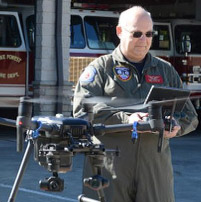The drones you need
For those of us who fly unmanned aircraft for public safety or commercial uses, there is growing pressure to buy the latest and greatest technology. All too often I see people making purchasing decisions based on what they've read or heard, but not what they have experienced or really need.
Once the market becomes more saturated with acquired drones, more people will be better able to make purchase decisions based on need rather than hype or trade show pitches. We are in the early days of utilizing unmanned aircraft in day-to-day operations, and I've indeed watched fire and law enforcement departments leap to buy drone technology and then try to figure out how to use it. After watching this acquisition wave, I'm left wondering if the pursuit of the latest UAS hardware is logical or smart.
It's not the latest hardware that makes people exceptional pilots, it is the use and skill at which they utilize the technology they already have that separates the real pilots from the rest.
From my point of view, the investments that should be made today should be focused on two fronts.
Time and experience: More time needs to be invested in planning and training to integrate drones into departmental processes and procedures that already exist. Having the most up-to-date hardware is a waste if it is not used properly. Training pilots on less expensive aircraft should take priority over buying more expensive drones. Before the budget is drained from drone purchase orders, building skills of departmental pilots and establishing clear guidelines on how the UAS will be incorporated into daily operations is the smartest thing to do based on my experience. Otherwise what happens is department members resist or forget to use the cutting-edge aircraft purchased with hard-fought budget dollars, and it is left underutilized and collecting dust.
Developing skills: While a wave of drone pilots has emerged, there is a terrible absence of well-trained and professional pilots, particularly pilots who understand public safety operations. Investing in pilot education and skills development will always be more important than buying the latest and greatest unmanned aircraft. A great pilot can get more use out of older technology than a less-skilled pilot can get out of the latest tools. Delaying new technology purchases also saves money for more advanced resources that can be purchased when pilots and other personnel are ready.
If you can find the emotional fortitude not to rush to buy the latest gear, you will find more affordable previous generation aircraft and aircraft payloads that do the job just as well in the hands of skilled operators. Take for example the fantastic DJI Z30 180X zoom camera. Less than a year after hitting the market the $8,000 camera is already selling for 60 percent less than its initial price.
From my field experience as a public safety chief pilot and a drone instructor with many departments, I have seen too many people and departments spend money on the newest thing and fly missions that could just as well have been handled by equipment that costs half as much as new. If you can resist the need to buy the latest cutting-edge technology, I would suggest considering previous generation aircraft that are the best value for the money and budget friendly. Then use that hardware to develop the experience, policies, and procedures to implement the UAS into your law enforcement or other public safety mission.
You don't need to be first in this field, you need to be the best.




